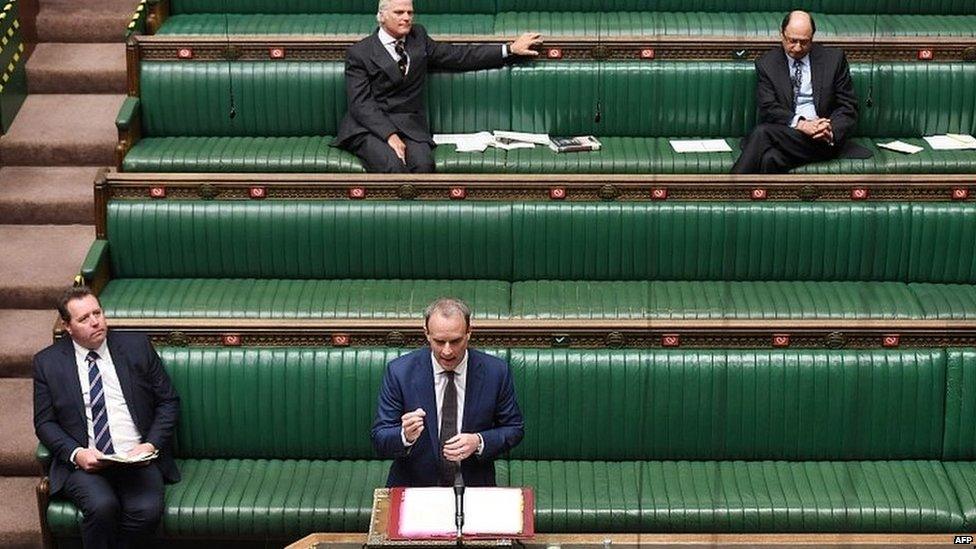Coronavirus: MPs allowed to vote remotely for first time
- Published

MPs are observing social distancing in their workplace
MPs are to be allowed to vote on new laws without being present in the Commons for the first time in its history.
Speaker Sir Lindsay Hoyle authorised the move as part of measures to cope with social distancing but said it would be temporary.
He told MPs he was "satisfied with the assurances" he had been given on the security of the system.
MPs are already taking part in debates and questions via video conferencing.
But the traditional practice of MPs casting their votes in person in lobbies is on hold during the coronavirus lockdown - meaning key pieces of legislation, such as Budget measures, have been stalled.
Announcing the changes, Sir Lindsay said: "I believe we are now in a position to take this historic yet temporary next step to remote voting into action.
"I am therefore authorising the use of this system of remote voting."
He added: "There may be some technical hitches as the new system beds in,"
Commons leader Jacob Rees-Mogg is expected to set out when the first substantial remote votes will take place in his weekly business statement on Wednesday afternoon.
'Temporary measure'
The Commons Procedure Committee earlier gave its approval for remote voting, following trials of the new system.
In a letter to Commons Speaker Sir Lindsay Hoyle, the committee's chair Karen Bradley said it believed remote voting was "suitable for use as a temporary measure" during the pandemic.
Virtual questions have become the norm in the Commons
The proposed system of voting is based on an existing digital platform - known as MemberHub - already used by MPs to table questions and motions remotely.
The cross-party committee said it was satisfied with the assurances it had been given about the security of the system but that this should be kept under review.
However, it recommended that the first remote vote was not related to legislation and the Speaker should have the power to extend or re-run any vote if there were technical problems.
Fall-back plan
Later on Wednesday, digital ballots will be held to elect chairs of two Commons committees - the Business Committee and the powerful Standards Committee.
More than 550 MPs "successfully voted" in two trials last week, the committee said, in which they reportedly were asked whether they preferred Spring or Autumn.
Some MPs are reported to have had trouble initially connecting and to have been left frustrated by the process although the second of the two run-throughs was thought to have gone much more smoothly.
Nevertheless, the committee said MPs' confidence would be "greatly enhanced" if there was a robust fall-back mechanism, in which MPs were able to contact officials and register their vote after appropriate checks if needed.
MPs have also been warned that allowing a "unauthorised" person, such as a member of staff or family, to vote on their behalf would be a breach of the MPs' code of conduct and anyone doing that would "expect to be punished accordingly".
While content to proceed, the committee said it would continue to examine other options, including the extension of current proxy vote arrangements, once restrictions on travel and movement were eased.
Social distancing measures are in force throughout the Palace of Westminster, with a maximum of 50 MPs allowed in the Commons chamber at any one time and the majority of questions being asked remotely.
Business has been pared back, with the focus on urgent statements and questions to ministers.
Ministers have insisted the truncated arrangements are temporary and will be reviewed on 12 May, although normal Parliamentary business is not expected to resume for some time.